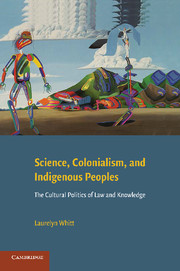Book contents
- Frontmatter
- Contents
- Preface
- Acknowledgments
- First Words
- PART I BIOCOLONIALISM AS IMPERIAL SCIENCE
- PART II THE HUMAN GENOME DIVERSITY PROJECT: A CASE STUDY
- 4 The Rhetoric of Research Justification
- 5 Indigenist Critiques of Biocolonialism
- PART III LEGITIMATION: THE RULE AND ROLE OF LAW
- Conclusion – The Politics of Knowledge: Resistance and Recovery
- Bibliography
- Index
- References
4 - The Rhetoric of Research Justification
Published online by Cambridge University Press: 04 August 2010
- Frontmatter
- Contents
- Preface
- Acknowledgments
- First Words
- PART I BIOCOLONIALISM AS IMPERIAL SCIENCE
- PART II THE HUMAN GENOME DIVERSITY PROJECT: A CASE STUDY
- 4 The Rhetoric of Research Justification
- 5 Indigenist Critiques of Biocolonialism
- PART III LEGITIMATION: THE RULE AND ROLE OF LAW
- Conclusion – The Politics of Knowledge: Resistance and Recovery
- Bibliography
- Index
- References
Summary
An article in the journal Science presented the following rationale for pursuing the Human Genome Diversity Project (HGDP): “Indigenous peoples are disappearing across the globe … As they vanish, they are taking with them a wealth of information buried in their genes about human origins, evolution, and diversity … each (population) offers “a window into the past” … a unique glimpse into the gene pool of our ancestors … Already, there are indications of the wealth of information harbored in the DNA of aboriginal peoples.” According to its advocates, the HGDP proposed to increase knowledge of human genetic diversity by preserving for future researchers the genetic materials responsible for that diversity. Ensuring the survival of the human sources of those genetic materials was not a scientific priority. Some of the Project's supporters may have regarded the latter as a social priority, although arguments from them to this effect are elusive. Indeed there is a decided sense of inevitability in the talk of “vanishing” that fueled the urgency of the research enterprise. In the words of geneticist Francis Collins, “I do think the urgency is a compelling argument … populations are not going to be there indefinitely for us to decide at some future date we would like to sample them.”
Preserving human genetic materials for future study is seen as a scientific priority; they are crucial resources for scientific knowledge production. Whereas the use of knowledge of genetic diversity is subject to ethical and political critique, its production (the story goes) is not.
- Type
- Chapter
- Information
- Science, Colonialism, and Indigenous PeoplesThe Cultural Politics of Law and Knowledge, pp. 84 - 104Publisher: Cambridge University PressPrint publication year: 2009



